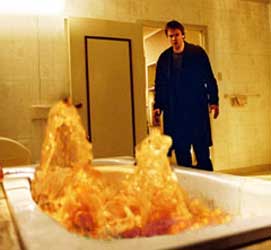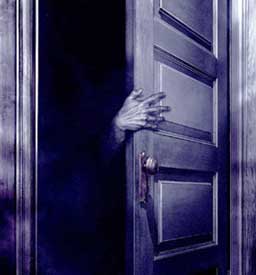Barry Watson plays the young who upon the death of his mother (Lucy "Xena" Lawless in a thanklessly trivial role) must return home & face the horrors of His Room, & the boogyman who really does live in the closet. His mother apparently went insane (the story is never clear if she was stark raving mad or merely depressed) shortly after her husband left the family (no one believes he was actually taken by the boogyman). So our hero's bedroom has been left unchanged in fifteen years.
It's all there waiting for him, including the boogyman, who in the intervening years has forged a few paths through his otherworld into other dark closets, so that it can pursue our hero even to such places as the neighbor's house, a ruined house where a ghost-girl once lived, or the motel down the road -- perhaps even, it is implied, anywhere on earth where there is a dark doorway or space under a bed.
 A story when well constructed & well told moves forward inexorably to a climax that may or may not be obvious all along (hopefully not too obvioius) but which once achieved has a feeling of inevitability. Too many horror films are constructed around a series of fright-gags for which the ending is as random as everything else that occurs. For The Boogyman, they filmed two endings, neither of them any good. The most that could be said of the alternate ending (included in the Special Edition DVD extras) is that it is even worse than the ending they used. A story when well constructed & well told moves forward inexorably to a climax that may or may not be obvious all along (hopefully not too obvioius) but which once achieved has a feeling of inevitability. Too many horror films are constructed around a series of fright-gags for which the ending is as random as everything else that occurs. For The Boogyman, they filmed two endings, neither of them any good. The most that could be said of the alternate ending (included in the Special Edition DVD extras) is that it is even worse than the ending they used.
The climax they used has our twenty-something hero Tim confronting the Boogyman in his childhood bedroom. We are given to understand that this super-powerful horrid creature is the product of this young man's childhood fears & is an otherworldly exaggeration of all the toys he was afraid of when small -- a mobile of creepy crows, a toy monster doll, & a static electricity lamp from Sharper Image. To defeat the monster all Tim has to do, it turns out, is break his toys.
This makes for a truly stupid non-climax, but worse, it does not allow for the events that actually unfolded in the story. His uncle has been taken into limbo in the closet-world, never to return, but while trying to fight the boogyman with a nail-gun, he accidentally wounds Tim. So a missing man will have his fingerprints on the nail gun that injured our nail-injured hero. To the police it's gonna look an awful lot like he did something to his Uncle Mike.
So too his girlfriend Jessica is devoured by the Boogyman in the bathtub (a sequence at odds with all the others unless that monster-doll was Swamp Thing), this having occurred in the motel they checked into so the clerk is going to know there were only two people in that room, plus our hero left his own blood on the rim of the tub. All the evidence is going to indicate he did something to his girlfriend.
Yet nowhere in the story does it deal with the fact that nobody is going to believe the boogyman did it & the evidence is clear that our hero is a serial killer. The dumb ending tries for a "happy" coda by having Tim open a sunny window & declaring it's over. It was probably a good choice to not have the boogyman jump out one last time in one of those archly cliche epilogs that make the climax meaningless in any case. But even avoiding the maximumuly stupid cliche of "Oh no! It's not either over!", anyone who kept track of the plot elements would know he's going to spend thirteen years of his life sitting on Death Row waiting for all the appeals to run out.
The idea of childhood fears bringing something truly horrendous into the world isn't new to horror cinema, but this film never made one believe that if the boogyman exists it is only because one little boy caused him to exist fifteen years ago. There is one flashback in the film where we see the father locking his terrified son in a dark closet & refusing to let him out until he overcomes fears he can never overcome. It might have been more believable if "a" boogyman (not "the" boogyman) came into existence because of growing hatred of an abusive father, which would also explain why the father was the first victim. But the script for this lousy film does not even consider the meaning of its own elements. So no, the boogyman is the product of a fear of toys, & to destroy evil, break some toys. Dumb.
There are plot-holes throughout, but my deepest criticisms of this film are reserved for that idiotic ending. Though they filmed only two endings (Tim's secondary girlfriend survives in the ending they used, so it'll only look like he killed two people instead of three that night) they could have filmed five endings, eight, a dozen. Because everything that happens climactically is far too thinly related to the events that came before, & any ending would be a matter of musical-chairs rather than inevitabilities that result from actions & causes.
I'd've made the world in the closet more elaborate & the conveyed the passages in expressionist black & white imagery, rather than just as Tim falling into one closet out & of another in a different house. I'd've had the father inside the close-world still alive, perpetually tortured. Since the closet-routes are shown to pass through time as well as space, I'd've considered the possibility of at least trying to save victims of the past, including his own father. I'd certainly have had Tim save at least the two victims from that last day, if only so the rational aftermath of our hero being blamed & going to prison would not be hanging out there unresolved -- but also so that he could actually serve a heroic role as saving nothing but his own ass makes him a rather undeserving ass, especially since he's to blame for it all. In fact, Tim was such a non-hero, the better ending might've been the discovery that he was himself the boogyman travelling through time & space, he dragged his cruel father into the closet, he jumped out of a closet & killed Jessica.
You too can make up any ending you want -- almost anything would've been better. Magic pennies could've beat the boogyman, a jumprope rhyme defeats the boogyman, a love of other toys defeats the boogyman as Timmy's childhood favorite, Fuzzy Bear, springs to action. Any ol' random choice -- because the story that was being told did not have any particularly inevitable outcome as would have been the case if the writer had even a small semblance of storytelling skill.
Never mind that when the boogyman finally is revealed he's a see-through CGI figure very cliche in design & poorly integrated with the human action. If it had actually been an interesting climax the poor quality of the FX would not have been consequential. A reasonable budget & reasonable actors & reasonable set design -- everything in a film can be reasonably well done, but if the story is stupid & the ending totally random, the film is a failure. The reverse is also true, if a film has no budget & the actors are on the short side of mediocrity & the sets are cheap & the cinematagrapher still learning, a rousingly good story can still be told, & that film's a success. Boogyman had all the ingredients of a credible film except a decent story well told, so the film fails.
Nevertheless, the film's ultimate failure is not evident until the climax is upon us & it becomes way too obvious none of it means anything after all & the writer never knew the how, why, where, what or who of a story dashed together without an adequate plan for a cohesive beginning, middle, & end. Until we see how sloppy & random the ending is, as viewers we are effectively immersed in a world where the boogyman is real, where a fascinating friendship & mutual concern develops between a haunted man & a ghostly little girl (the influence of M. Knight Shamalangadingdong's Sixth Sense), where every dark closet or cupboard is a menace.
This film is well acted (except in the climax where the boring FX supplant the star entirely). The cinematography is effectively atmospheric & menacing. This film really had a great deal in its favor. But that one missing factor -- moderate skill at basic storytelling -- rendered it finally pointless, ineffective, & inferior.
copyright © by Paghat the Ratgirl
|

 A story when well constructed & well told moves forward inexorably to a climax that may or may not be obvious all along (hopefully not too obvioius) but which once achieved has a feeling of inevitability. Too many horror films are constructed around a series of fright-gags for which the ending is as random as everything else that occurs. For The Boogyman, they filmed two endings, neither of them any good. The most that could be said of the alternate ending (included in the Special Edition DVD extras) is that it is even worse than the ending they used.
A story when well constructed & well told moves forward inexorably to a climax that may or may not be obvious all along (hopefully not too obvioius) but which once achieved has a feeling of inevitability. Too many horror films are constructed around a series of fright-gags for which the ending is as random as everything else that occurs. For The Boogyman, they filmed two endings, neither of them any good. The most that could be said of the alternate ending (included in the Special Edition DVD extras) is that it is even worse than the ending they used.